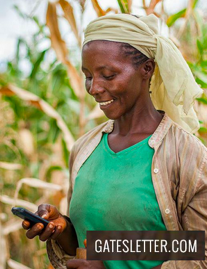Tag: Bill & Melinda Gates Foundation

Gates Bets on Agriculture to Reduce Poverty in Annual Letter
Africa & Middle East: Bill and Melinda Gates explain why breakthroughs in farming will help improve the lives of poor people in the next 15 years faster than ever before.
Read MoreFarmers in Africa Profit from Higher Quality Coffee
Africa & Middle East: With support from the Bill & Melinda Gates Foundation, TechnoServe is undertaking a major initiative to help small-scale coffee farmers in East Africa double their incomes. TechnoServe business advisors focus their efforts in four areas: agronomy and training to provide farmers with practical knowledge that will increase yields; installation of wet mills to produce washed […]
Read MoreSoy Program Boosting Farmer Incomes in Southern Africa
Africa & Middle East: Sub-Saharan Africa contributes less than one percent of the world’s soy, but the crop has the potential to become a key source of income for the region’s farmers. In the next 10 years, TechnoServe hopes to significantly increase the incomes of 200,000 households in southern Africa through the development of a competitive local soy industry. […]
Read More
